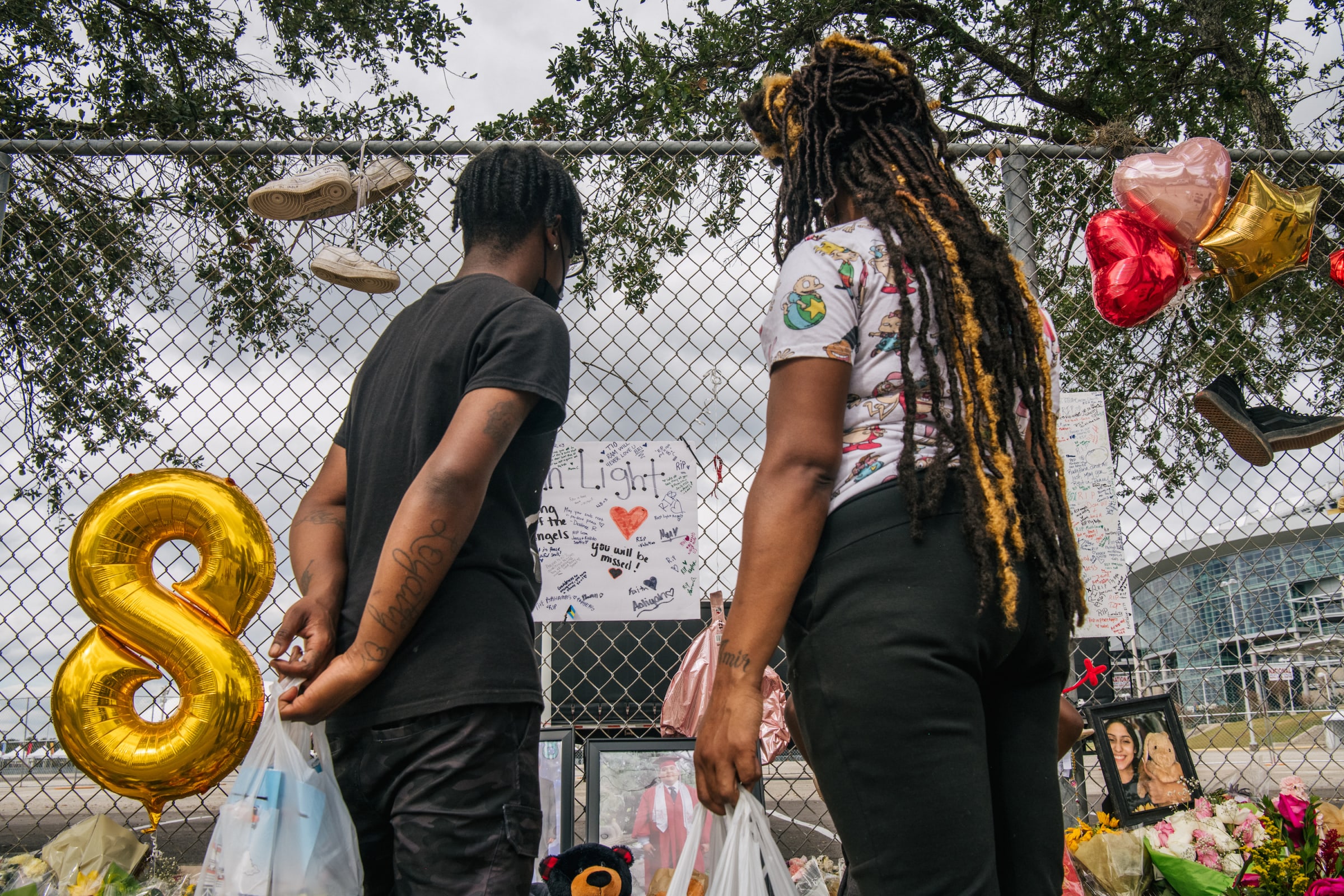The Houston community is still reeling from the fatal events of Travis Scott’s Astroworld Festival last Friday. Nine people have died and many victims—including a nine-year-old boy—are still fighting for their lives after being trampled when the frenzied crowd surged toward the stage.
This past week has also brought heavy scrutiny on the rapper, who is being sued by several parties over the tragedy as he fights off accusations of having a history of encouraging the very behavior that saw more than 300 people needing medical attention after his recent performance.
Over the weekend, Scott put out an initial address, saying he was devastated by the events and that he would work with local officials on determining what went so wrong. Yet, presumably for legal reasons, he never offered a direct apology—which was not lost on many outraged over the needless loss of life.
By Monday, Scott’s team said the 30-year-old would pay for all funeral costs and refund tickets sold to more than 50,000 people. Paired with the press release was also a partnership announcement, stating Scott would be teaming up with the counseling app BetterHelp to offer a month of free therapy for victims.
“These are the first of many steps Travis plans on taking as a part of his personal vow to assist those affected throughout their grieving and recovery process,” the statement read.
To many it was seen as a blatant attempt on Scott’s part to do damage control, and an icky marketing ploy on behalf of BetterHelp—a company that has already landed in hot water for shady practices, including selling patients’ data to third parties, such as Facebook (now known as Meta.)
The blowback came swiftly as many questioned the circumstances of Scott’s team seeking out partnership opportunities in the midst of a tragedy that numerous parties feel he was at least partially responsible for.
By Wednesday, as the perceived PR stunt was being ripped to shreds and questions about the deal’s terms arose, BetterHelp rolled out a FAQ page to attempt to clear the air, claiming it was Scott’s team who had approached the company about working together.
BetterHelp denied that there was any “sponsorship,” “brand deal” or payment between the two parties, and said by participating in the offering victims wouldn’t be waiving any legal rights in case they planned to take legal action against Scott and other parties.
The service also said no one would be billed automatically at the end of the month and denied claims that BetterHelp already offered a free month of therapy for new patients.
“As a mission-driven organization, we’re happy and proud to help whenever we can, such as with the free therapy we provided to people impacted by Hurricane Dorian, the El Paso shooting, the California Wildfires, the evacuations from Afghanistan, and other events in which mental health support was needed,” the statement added.
“Last month, it announced a partnership with rapper 6lack—but had worked out a deal to offer six months of free therapy for at-risk young adults who were transitioning out of foster care and looking to live a more stable life.”
BetterHelp has long relied on partnerships to attract new patients. A quick search through social media shows that dozens of influencers and podcasters have at one point been sponsored by the virtual counseling service, many of whom have also offered their audiences a month free with their respective promo codes.
The company has previously worked with big names, including Ariana Grande and Venus Williams. Last month, it announced a partnership with rapper 6lack—but had worked out a deal to offer six months of free therapy for at-risk young adults who were transitioning out of foster care and looking to live a more stable life.
When asked why there is such a big difference in the length of free therapy time between BetterHelp’s partnership with Scott and 6lack, a spokesperson told The Daily Beast the initiative was through its “impact and advocacy team,” noting the six months of free therapy was being given to 50 young adults.
“In order to provide support as quickly as possible, we are starting this initiative with one month of free therapy,” a spokesperson said. “We will be extending support for those who need it, but our priority is to give people access as quickly as possible.”
But beyond whether BetterHelp and Scott were aligning in the name of a PR strategy, Scott’s decision to work with BetterHelp in the first place has raised some eyebrows, as the company has long faced complaints from past patients who claim the service it offered was downright abysmal.
Several former BetterHelp users have detailed their concerning experiences with therapists on the platform, from abrupt one-word responses to thoughts of suicide and even interrupting a session to make a smoothie.
A former patient, who did not wish to be named, told The Daily Beast they had sought out BetterHelp’s therapy service in 2018 and were stunned when they signed up under a discounted trial period, but a few weeks later were hit with a charge of $260 for a month of counseling. (The Daily Beast has reviewed an email confirming the charge.)
Just 21 years old at the time, they said it was a lot of money for them—and even would be a financial stretch now. “They really made it seem like it was a lot more affordable,” they explained. “I thought I was just trying it out for a bit without much commitment, but then a few weeks later I saw that and really panicked.”
Even cost aside, the “service sucked and was super alienating and not useful,” they added.
“I was never able to really talk to anyone. Imagine Tinder for psychotherapy, but worse.” (Disclosure: Tinder is owned by IAC, the parent company of The Daily Beast.)
Graham, who uses they/them pronouns, told The Daily Beast they used BetterHelp in the summer of 2017. At the time, there was a litany of stressors in their life, such as feeling behind on work for their Master’s degree, PhD applications, and recently working through their partner cheating on them.
“Given just all the shit that had been floating around in my head, how I’d been feeling for a while, and how poorly my work was going, I figured it could be worth a shot to try talking about it with someone totally outside the situation,” Graham explained.
But instead, the therapist “more or less just decided to latch” onto the issue of the partner cheating, encouraging Graham to promptly break things off.
“They didn’t really address any of the rest of the issues; I tried to make it clear that I wasn’t interested in doing so, and that even if I did the actual problems in my life and with my mental health wouldn’t improve,” Graham said. “They kind of just went off on a tangent that sounded far less like a therapist guiding you through your feelings, thoughts, and problems, and more like an overly chatty stranger giving you unsolicited opinions. I hadn’t really had much experience of therapy before, but I was pretty sure therapists weren’t supposed to jump to prescribing major life decisions.”
“More than unprofessional, it felt rude and hurtful just by how casual and blasé they seemed. I didn’t really feel listened to at all, felt shamed for both my own decisions and my own view of what my general issue actually was, but I felt too down and tired to try and counter it or argue. Eventually I just closed the app and cancelled.”
“More than unprofessional, it felt rude and hurtful just by how casual and blasé they seemed. I didn’t really feel listened to at all, felt shamed for both my own decisions and my own view of what my general issue actually was, but I felt too down and tired to try and counter it or argue. Eventually I just closed the app and cancelled.”
While Graham said they wouldn’t recommend completely writing off BetterHelp to anyone seeking help, noting improvements could have been made over the years, they urged caution.
They also advised to not let one bad experience put someone off from seeking out help. “Even if it doesn’t seem like it and it may be a struggle, there’s someone out there who will be able to help.”
But, they added, “I can’t say BetterHelp, or any similar service, would be the first door I’d suggest knocking at though.”
Accredited counselor and psychotherapist Alexandra Lacey told The Daily Beast that working with an insensitive or unresponsive professional could potentially be really damaging to those seeking out help.
“Obviously, fully trained and qualified therapists cause harm, but untrained ones are more likely to be harmful and detrimental to people,” Lacey explained. “If you’ve reached out for help to find that you’re being answered to like you’re talking to a chat bot, that’s going to really discourage you from reaching out again to someone who might actually be able to help you and is actually qualified.”

A couple views a memorial dedicated to those who died at the Astroworld Festival outside of NRG Park on November 09, 2021, in Houston, Texas. Nine people were killed and dozens injured last Friday in a crowd surge during a Travis Scott concert.
Brandon Bell/Getty
But Lacey is primarily concerned with BetterHelp and Scott only offering a month free to deal with the trauma of Friday’s events.
“I think it definitely takes a few sessions to get to know the therapist that you’re seeing and build a level of trust, where you feel comfortable discussing your trauma,” she said. “A month—that’s not a long period of time at all to get work done.”
Especially since some of these people could go on to develop PTSD, which is a very difficult thing to live with that takes way, way longer than a month to do any work on. Even if they don’t develop PTSD, it’s gonna be maybe longer than even six months to actually fully accept everything.”
BetterHelp positions itself as a cost-effective alternative to traditional therapy, charging $65 to $90 a week for unlimited use of its services. The weekly cost is billed at the end of the month, resulting in a $260 to $360 charge.
So, when compared to traditional therapy costs, which can average around $200 a session, BetterHelp seems like a fantastic deal. But the price can be a sticker shock for someone who had forgotten they had signed up for the service under a free trial.
Described by some as the “Uber of therapy,” BetterHelp essentially treats its “licensed therapists and mental health experts” as freelancers or gig workers, with the platform connecting professionals to patients through text, phone call, or video chat.
Jeff Guenther, founder of the popular site Therapy Den which connects therapy seekers with therapists for free, shared this week that a BetterHelp director of business development had reached out to him in March 2019, offering him a partnership opportunity.
In exchange for listing BetterHelp therapists on his website, Guenther would receive a $300 referral fee for every patient that signed on to BetterHelp, dangling the possibility of earning up to $80,000 a month.
In September, Guenther previously claimed BetterHelp therapists were paid around $30 an hour—a drastic drop from the standard rate of $100. Plus, he claimed therapists’ pay was based on word count when texting patients. If they went over a certain word count, they would not be paid any extra.
There was also concern about whether BetterHelp was actually vetting the “professionals” it was offering up to people seeking help—as in 2018 when its terms and conditions pinned the responsibility of verifying the expert’s credentials on the prospective patient. According to its most recent update to its terms and conditions, that section has since been removed.
BetterHelp states it’s not a good fit for anyone under the age of 18, if someone is in an urgent crisis, or if they don’t have a reliable internet connection.
Astroworld had around 50,000 people in attendance, with no age requirement on who could attend the sold-out two-day event. Nine people died when the frenzied crowd surged toward the stage, and two of the victims, John Hilgert and Brianna Rodriguez, were under 18. At least five people who were taken to the hospital were also under the age of 18.
And as of Wednesday, nine-year-old Ezra Blount, who attended the concert with his father, is still fighting for his life after he was trampled by the crowd.










